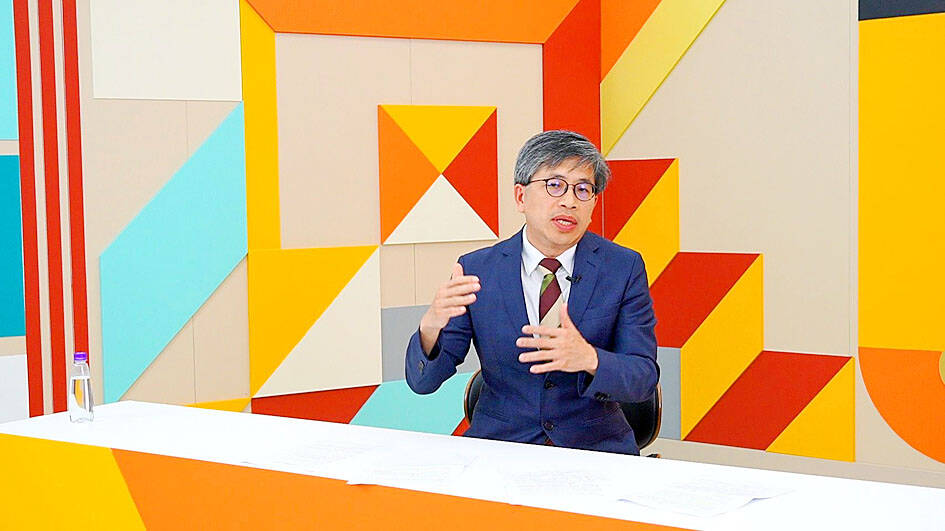The Taiwan Semiconductor Research Institute has made progress in developing chips capable of operating in temperatures as low as 4 Kelvin (minus-269°C), contributing to domestic quantum and aerospace development, National Institutes of Applied Research president Tsai Hung-yin (蔡宏營) said in an interview with the Chinese-language Liberty Times (sister newspaper of the Taipei Times) yesterday.
The chip is the first of its kind in Taiwan and is capable of operating at 4 Kelvin, a feat that would bolster Taiwan’s quantum technology development, Tsai said.
The development of such chips would also buttress Taiwan’s development of aerospace technologies, as temperatures in outer space are close to 4 Kelvin, he said.

Photo: Ting An-yu, Taipei Times
The chip can be used in satellite communication systems and equipment, he said, adding that Taiwan’s ability to research and develop such technology removes the need to purchase them from abroad.
The Hsinchu-based semiconductor institute has also developed RAM that would allow in-memory computation, Tsai said.
The success of Taiwan’s semiconductor industry was not achieved over a short time, he said.
The industry could not be where it is today were it not for the decades of efforts of the semiconductor institute’s preceding organizations, the National Nano Device Laboratories and the National Chip Implementation Center, which fostered talent in the industry, he said.
The semiconductor institute’s ability to provide a one-stop solution, from theory to implementation and application, has been the envy of foreign academic organizations, he said.
“We are pursuing overseas collaborations in the form of seminars and tech forums to share our experiences,” Tsai said.
The semiconductor institute is willing to make its services available to academic institutions in Taiwan and around the world to create an open research-and-development platform, he said.
It is also working with Taiwan Semiconductor Manufacturing Co and other firms to develop the latest copackaged optics technologies, which are expected to become operational by next year, Tsai added.
Meanwhile, the National Center for High-Performance Computing in March introduced the Resilient AI Platform, primarily a business-to-business platform to facilitate the full harnessing of artificial intelligence (AI) technology, Tsai said.
The platform is part of the National Science and Technology Council’s Chip-based Industrial Innovation Program, which has set aside funds to create AI infrastructure from last year to 2028, he said.
For example, the Taichung City Government has used the system to enable collation of geolocation information simply by feeding photographs into the system, he said.
The Penghu County Government has also used the digital twin technology to create a “3D harbor,” enabling the county government to more effectively manage the ships docked there, as well as issue wind and wave warnings, as well as weather forecasts, he added.

Taiwan has received more than US$70 million in royalties as of the end of last year from developing the F-16V jet as countries worldwide purchase or upgrade to this popular model, government and military officials said on Saturday. Taiwan funded the development of the F-16V jet and ended up the sole investor as other countries withdrew from the program. Now the F-16V is increasingly popular and countries must pay Taiwan a percentage in royalties when they purchase new F-16V aircraft or upgrade older F-16 models. The next five years are expected to be the peak for these royalties, with Taiwan potentially earning

STAY IN YOUR LANE: As the US and Israel attack Iran, the ministry has warned China not to overstep by including Taiwanese citizens in its evacuation orders The Ministry of Foreign Affairs (MOFA) yesterday rebuked a statement by China’s embassy in Israel that it would evacuate Taiwanese holders of Chinese travel documents from Israel amid the latter’s escalating conflict with Iran. Tensions have risen across the Middle East in the wake of US and Israeli airstrikes on Iran beginning Saturday. China subsequently issued an evacuation notice for its citizens. In a news release, the Chinese embassy in Israel said holders of “Taiwan compatriot permits (台胞證)” issued to Taiwanese nationals by Chinese authorities for travel to China — could register for evacuation to Egypt. In Taipei, the ministry yesterday said Taiwan

‘LIKE-MINDED PARTNER’: Tako van Popta said it would be inappropriate to delay signing the deal with Taiwan because of China, adding he would promote the issue Canadian senators have stressed Taiwan’s importance for international trade and expressed enthusiasm for ensuring the Taiwan-Canada trade cooperation framework agreement is implemented this year. Representative to Canada Harry Tseng (曾厚仁) in an interview with the Central News Agency (CNA) said he was increasingly uneasy about Ottawa’s delays in signing the agreement, especially as Ottawa has warmed toward Beijing. There are “no negotiations left. Not only [is it] initialed, we have three versions of the text ready: English, French and Mandarin,” Tseng said. “That tells you how close we are to the final signature.” Tseng said that he hoped Canadian Prime Minister Mark Carney

POSITIVE DEVELOPMENT: Japan and the US are expected to hold in-depth discussions on Taiwan-related issues during the meeting next month, Japanese sources said The holding of a Japan-US leaders’ meeting ahead of US President Donald Trump’s visit to China is positive news for Taiwan, former Japan-Taiwan Exchange Association representative Hiroyasu Izumi said yesterday. After the Liberal Democratic Party’s landslide victory in Japan’s House of Representatives election, Japanese Prime Minister Sanae Takaichi is scheduled to visit the US next month, where she is to meet with Trump ahead of the US president’s planned visit to China from March 31 to April 2 for a meeting with Chinese President Xi Jinping (習近平). Japan and the US are expected to hold in-depth discussions on Taiwan-related issues during the